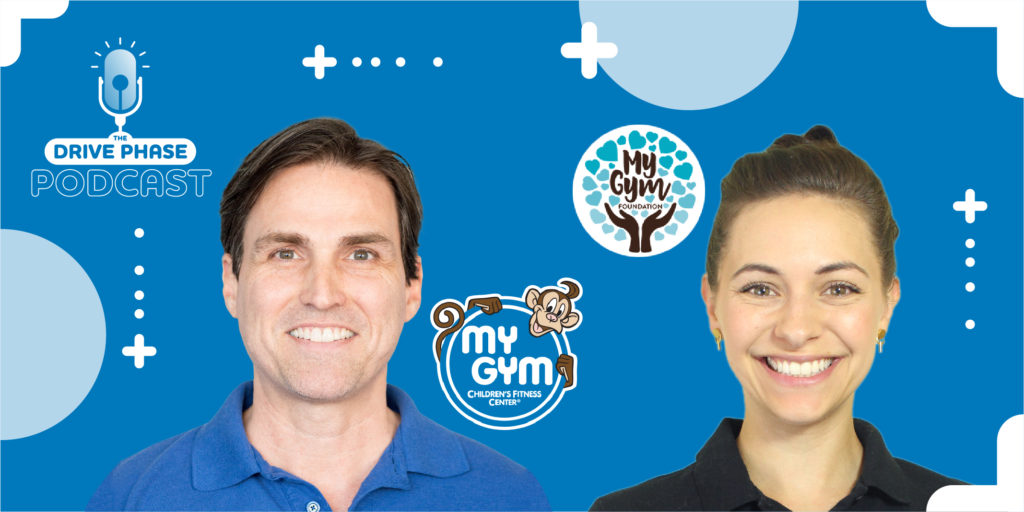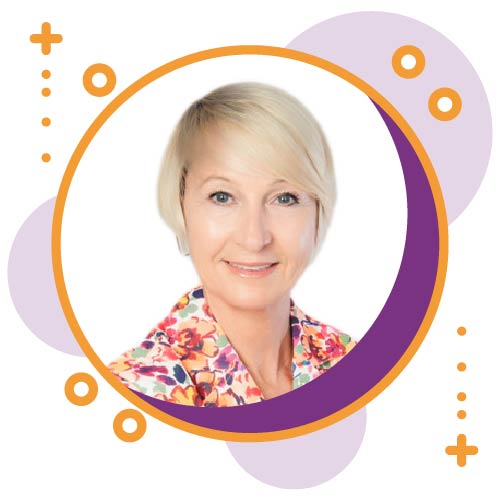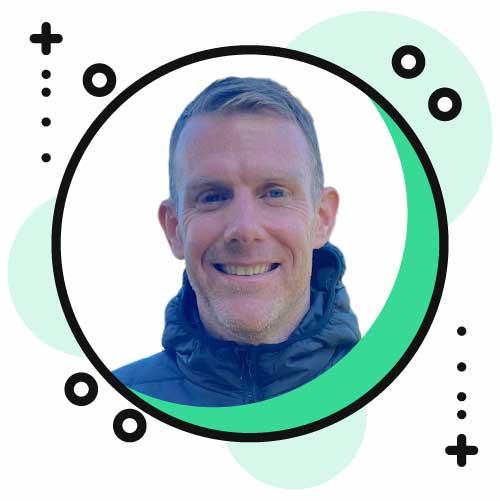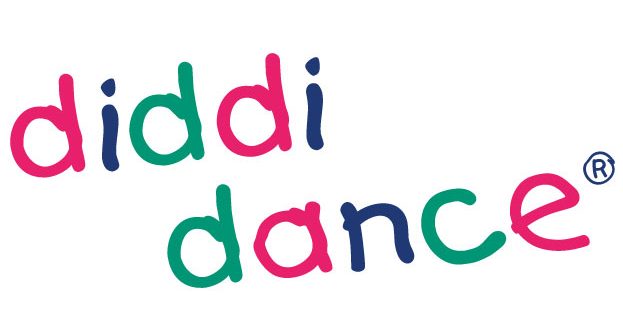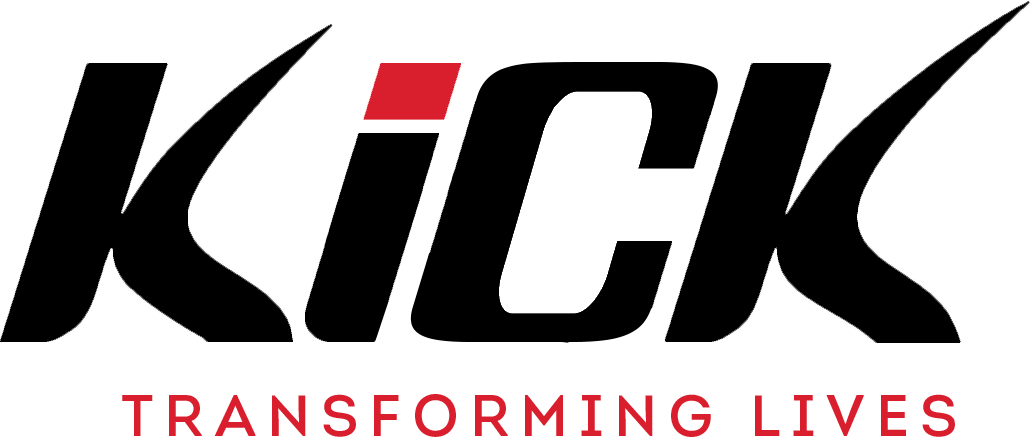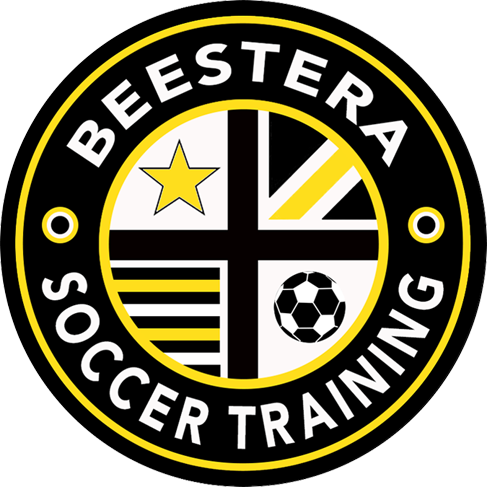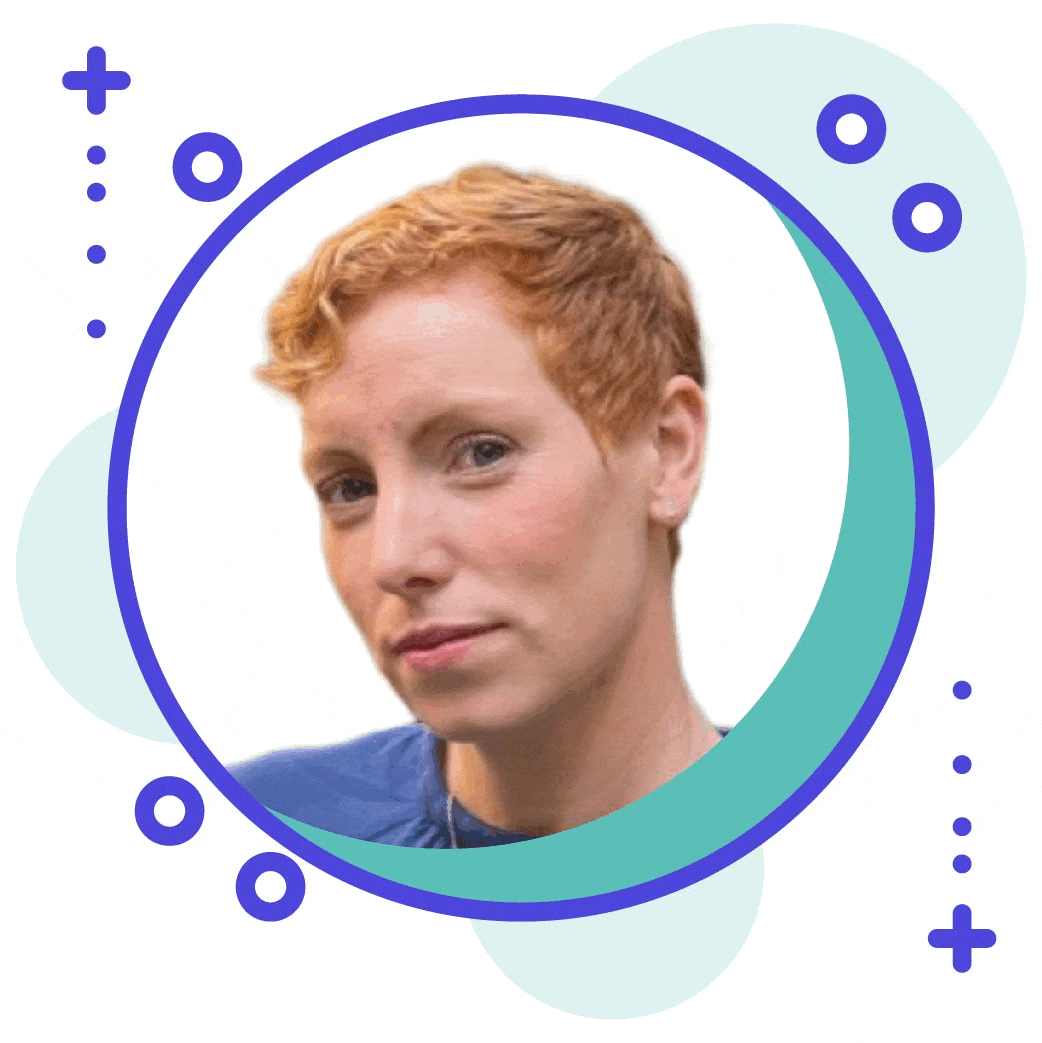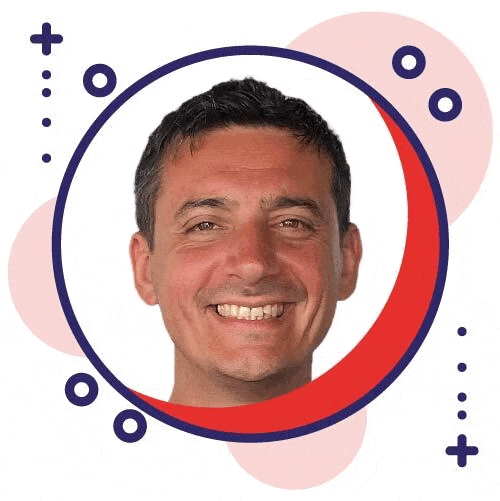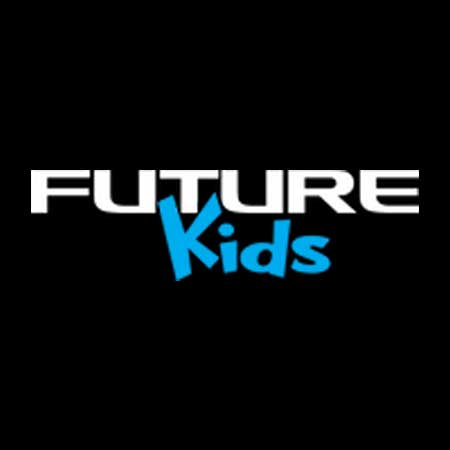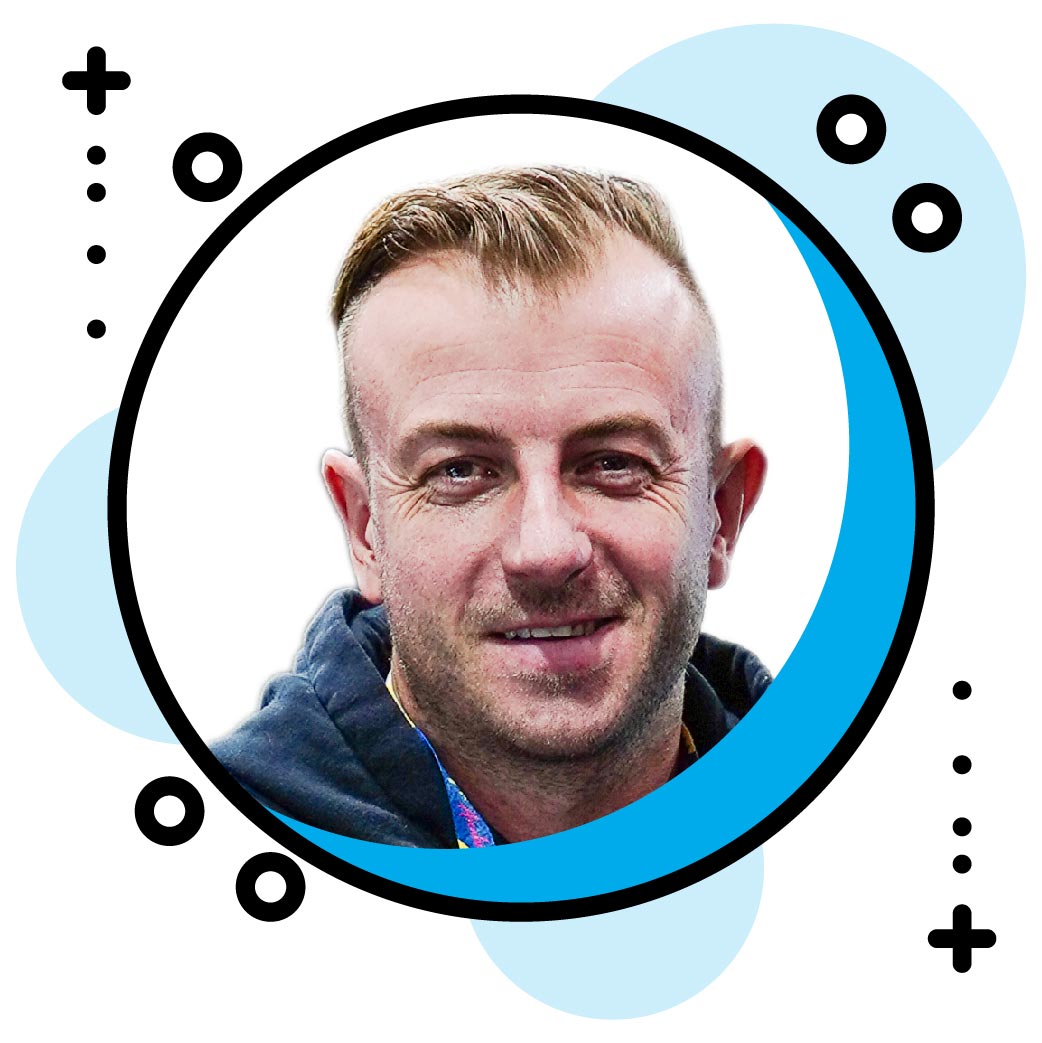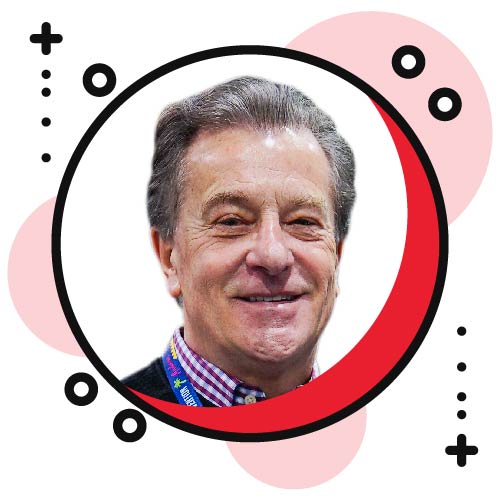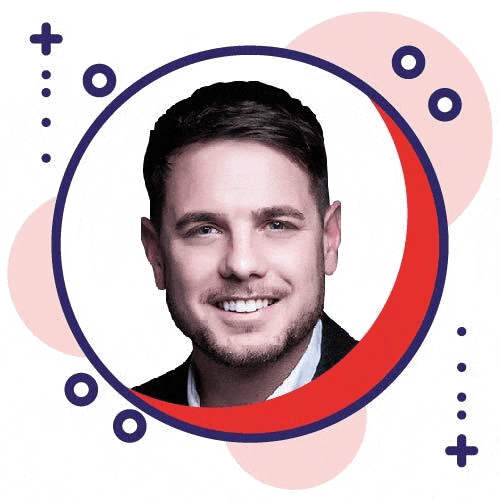Aleah Whaley 0:00
I have to say that Cory completely leads by example. And I think that is a huge part of why My Gym is so strong. All of the My Gym owners know Cory by name. They know that they can have a very open, personable relationship with him. He leads his team by being on the ground with us. By having that experience, having gone through teaching the classes so he knows what he’s talking about when he’s talking with his staff. No one could ever say, well, Cory, you have no idea because you’ve never done that. And from my experience, that’s rare for a CEO. To know that the person you’re working with has experience at all, and also is very compassionate through it. So I think that’s been huge.
James Moore 0:58
From Coordinate Sport, it’s the Drive Phase. A show about sports founders, leaders and experts, and the stories behind their business journeys. Our guests on this episode are Cory Bertisch and Aleah Whaley. Cory launched the My Gym brand in LA in 1987, with a vision to provide an environment for children and young people to be physically active and enjoy a positive first experience. We dig into how he scaled from one location to 700 and what it takes to maintain the brand at this level. Aleah heads up the My Gym Foundation, and we hear the story behind the charity and how she is impacting 1000s of children with gifts of support. This episode not only gives us an insight into the business journey but also shows what is required to support a network of partners and the wider community, especially at this time. I really enjoyed this conversation with our very first guests from the US, so let’s take a listen.
We’re delighted to have with us today probably one of the first and most successful global children’s activity franchises, My Gym. The children’s fitness centres were launched over 30 years ago, with currently 600 locations in 30 countries. We’re really excited to have Cory Bertisch here with us, CEO of My Gym, and Aleah Whaley, Executive Director of the My Gym Foundation. Thanks for being with us today.
Cory Bertisch 2:22
Good to be here, James.
Aleah Whaley 2:24
Yeah, thank you for having us.
James Moore 2:26
Thank you, and welcome to the Drive Phase Podcast. We’ve managed to navigate the time difference, so over here in the UK we are getting ready for Christmas, but it’s cold, wet, and gloomy outside. What’s it like where you are at the moment?
Cory Bertisch 2:40
It is sunny, bright, and warm in Los Angeles, California. It is not like that in the rest of the United States though. Lots of snowstorms.
James Moore 2:53
Just thought I’d make our listeners jealous as most of them are UK based. This is a first for us, having two guests at once, but usually, we begin with getting to know you a little bit better. And because we’re talking about physical activity and children’s development, we’re trying to look at your childhood and what your first experience of elementary school was. So if you could take it in turns, maybe ladies first, let us know what your early years were like.
Aleah Whaley 3:21
So for me, I actually was not athletic at all as a kid. I loved performing, dancing, singing, and because of that, my parents never encouraged me to get into sports at all. I’m terrified of balls coming at my face in terms of any sport. But I love to dance, and I got my physical activity in that way. And I was in plays and musicals and things like that.
James Moore 3:55
One of the questions we always ask is how PE and school sport has shaped your experience, whether it turned you off from sport for life or ignited something. So I know, Cory, you came at it from a totally different angle. You were a star athlete in school?
Cory Bertisch 4:15
I was a good athlete in high school.
James Moore 4:18
I’m imagining the varsity jacket, and obviously, that’s my view of America. Did you have one of those?
Cory Bertisch 4:25
Yeah, that’s a good impression of an athlete with the varsity jacket. Sports was my life as a child growing up, so sports leagues and PE in school. Although, I saw it turn off a lot of kids, which was a precipice for what became a philosophy in My Gym. But when I realised that I couldn’t be a professional athlete, I knew I wanted to do something in my life, something physical, something with sports. So yeah, sports is my life and continues to be my life through My Gym.
James Moore 4:58
Fantastic, and do you think you were always drawn towards becoming an entrepreneur or a business leader?
Cory Bertisch 5:04
I think I was. I was born in a family of entrepreneurs. As generational as I can think, everybody owned their own business. I truly wanted to be a professional athlete. I’m the opposite of Aleah. I did like balls flying in my face, any ball sport. I also love children. I worked with kids in need throughout Junior High School and high school. When I graduated from the University of California at Santa Barbara, I thought I was going to be a children’s therapist.
James Moore 5:37
So you studied psychology. Is that right?
Cory Bertisch 5:40
I did, and I started to do my hours at UCLA with one of the professors of the psych department. Finding My Gym was kind of by accident. I continued to be an athlete on the side, so I was on teams and studying to be a psychologist when I found My Gym. It was an existing gym, a fairly small indoor facility for young kids. And it’s not sports necessarily. There’s a sports skill element to it, but it was physical, and it was working with young children. And a lot of those kids were in need, and it was through that the foundation was born. So yeah, I think my early acclamation to sports and being successful in sports, and my entrepreneurial spirit probably brought me to the beginnings of My Gym.
James Moore 6:33
Definitely, and I think of those transferable skills. My background is in track and field, so we have the same fundamentals of running, jumping and throwing etc. They can transition across everything. And I guess Aleah, even though the performing arts maybe not a sport, but with those skills of dancing, being confident and being able to perform etc. Have you managed to use any of those skills in your current role?
Aleah Whaley 6:59
Definitely. I actually worked at one of our My Gym locations, and just having the performance background helps to interact and entertain kids and keep up with them physically. At My Gym, not only do we do physical fitness, learning and education, we also have an interactive, entertaining element to it. As teachers, you would show the kids how to do the different skills that you would want them to try, and we help keep them engaged by using that performance element by doing silly sticks, little goofy actions, things like that. So you know, that definitely helped carry through when I was working at My Gym.
James Moore 7:47
Before you started at my gym, am I right in thinking you had an acting career before you came into the business?
Aleah Whaley 7:55
Yeah. I went to Chapman University just south of Los Angeles. I had a BFA in Theatre Performance. I moved up to LA to study acting and audition, I ended up taking some commercial acting classes with Stuart K. Robinson, and he is the one who brought me into the My Gym Foundation. I had been working with him for a few years and was looking for a job, and they were looking to fulfil this position, so he brought me in, and I jumped in feet first and ended up loving it. I haven’t left it since so.
James Moore 8:38
Fantastic. So we always look at the genesis of the organisation and definitely want to touch on the foundation, but I’m assuming the My Gym corporate side came first?
Cory Bertisch 8:49
Yes.
James Moore 8:49
I’ve got down here founded in 1987. When you first started at My Gym, it wasn’t actually in the US at that time. Is that correct?
Cory Bertisch 8:59
So I’m not the founder of the very first My Gym. The concept was founded in 1983 by Yacov and Susi Sherman. In 1988 when I graduated college, I bought their first little family My Gym, and they opened another one in another area of California, and eventually another one. And then we scaled and franchised it. We bottled everything, created all the secrets of success and scaled it up with these partners.
James Moore 9:33
Fantastic. So what was that like in terms of you’ve got the initial unit there, the first location. When did you know you had something that you could scale?
Cory Bertisch 9:45
At 22 or 23, we fell into this business that was not sports, was not psychology, but combined both. And I would say after a year of working day in and day out, and this is just post-college, so most of my friends were finding their footing having fun, and maybe it’s my entrepreneurial spirit, but I dug right in. And seven days a week for a year, we worked on this little business. It was a family business that certainly had its structures and curriculum programming, but we worked hard every day. And I think a year later, I had all of my friends and clients coming in with their little kids saying we want to do one of these. We speculate the money you’re making, and it seems like so much fun. So I think it was about a year later we possibly were going to open another one, another two, another five. Or, at the time, it was more about franchising and less about licencing. Let’s create a franchise package. And we went from a small, intimate family business with three or four gyms in LA, which is where it started, and I would say the next few years, we scaled with our friends, family, some close clients of the gym, and we probably opened 10 or 12 more gyms. And then by the year 2000, so about ten years later, we had become what I call a professional franchise company. It was the best of both worlds because we always had that family feel. We didn’t come from strictly business backgrounds. There was a lot of spirit, but it wasn’t just technical business. It was being great at what we did and great at working with the kids. And so the best of both worlds converged at the turn of the century, where we had built those systems, curriculum, legal documents, protocols and secrets, but we still had our family feel. And I think we probably had expanded to about 50 to 70 gyms at that point.
James Moore 11:49
Okay then, so you hit the start of the century and was it at that point the growth curve just took off?
Cory Bertisch 11:55
Yes, I think it really took off in the late 1990s. I coach this with people all the time. When you’re starting a business, you have all these roles. You have a Head of Sales, CFO, Head of Finances, Head of Marketing, Head of Curriculum. And at first, the founder of the business needs to play all those roles. I was the travelling support person, I had my friends, who I had promised stock to, and very little money, helping me open gyms, sell gyms, develop the franchise, talk to people. So when those roles could be filled by capable people, and by great people, that was when it really took off, and that was in the late 1990s. And by the time we got to the turn of the century, it was clicking on all cylinders. Looking for franchisee marketing was out there in a big way, and I think we were getting probably 500 leads a month, choosing two or three, maybe five to open per month. Which would get in line, as you don’t just choose somebody and open them, it’s a 6-8 month process with all the things you need to open them, find a location, train them. It was really clicking by then, I would say. We could open as many gyms as we wanted from the turn of the century until the 2008 recession.
James Moore 13:20
Looking at the model, I think you’re probably still ahead of the curve, you’ve got a few locations here, and I’m assuming you’re still looking to grow. But what you’re doing in that mix of the psychology and the physical activity is still relevant today right? It’s still quite a new concept in a lot of territories, I’m assuming. Is that what you feel was leading all those leads coming in? What do you think was the driver for all that interest?
Cory Bertisch 13:49
You said something very interesting. From my psychology background and the philosophies I’ve developed, I think it’s part psychology, part positive thinking. And I believe that our success was grassroots. I had five people work for the company, and then I had ten people, twenty people, five franchisees, and they all had a staff. And then eventually 100 staff. And I believe that 1000s of people became really passionate about what we were doing, which we still haven’t really talked about the service that we do, but they were passionate about what we were doing, helping humanity, and helping kids develop skills. That’s how I believe we started getting all those leads. Our only form of franchise marketing early on was a sign in the gym that said, hey, if you like what’s going on here, call this number. So that’s how I believe it’s spread and became so popular in the beginning.
James Moore 14:48
Yeah, and obviously, they did like what they were seeing. I know you touched on it there, but if we were going to talk to someone who’s never heard of My Gym, probably not many people out there, but could you paint the picture of the programme? I know you’ve got the three models, but what does a standard My Gym location and programme look like?
Cory Bertisch 15:08
A typical My Gym location is 2500 to 3000 square feet indoors. Nice, soft, plush carpet, nicely painted kid-friendly walls, and equipment that we make half ourselves. So it’s proprietary, and we make the equipment interlink and change. So we can change our setups with slides and rings and jungle gym equipment. We also have a swing support system built into the ceiling, with ropes coming down with connectors at the end where you can connect swings to it, and trapezes and rings and all sorts of things, climbing ladders, ropes. So if you’re looking at the gym, it’s mostly a big indoor floor space, with the equipment that we make ourselves and a swing support system. But it’s very structured. We run sessions for babies three months to nine months, children 11 months to 17 months, which we call wobblers, and our next group jumpstarters are also very close in age group. So we do a specific curriculum, and it’s very structured even for the babies. We’re a traditional learning centre in a lot of ways. And we believe it’s the right way to do it. And for safety, there’s some child-led learning that goes on, but for the most part, it’s a structured hour, where we have 13 different parts of the class. At a younger age, it’s half structured play. So you come in as a client, you get enrolled in your class with 15 other parents and children, and we take you through this innovative programme that was created in the early 80s and adapted over time. But that’s what a gym looks like, was that clear, James?
James Moore 17:05
Yeah, for sure. In terms of the clientele, is it just families, or do you work with schools? I know Aleah, with the foundation, you’re working with other types of organisations, but is it just parents who bring their children or do you connect with local schools to bring in classes of children?
Cory Bertisch 17:22
Our core business is the classes. So gym owners will have 30 to 40 45-minute to one-hour classes throughout the week. But we do everything at this point. We have schools come in, we go to schools, we have different types of classes, preschool alternative, we have karate and dance.
James Moore 17:46
And birthday parties? I’m assuming you’d get a lot of birthday parties. It sounds like the ideal spot.
Cory Bertisch 17:52
75% classes 25% birthday parties.
James Moore 17:57
Fantastic. So we’ve got the set-up and the size and scope of My Gym. In terms of the My Gym Foundation, when did that start? I know you joined the business after Cory had scaled it. When did that start Aleah, and how did you get involved?
Aleah Whaley 18:13
So let me lead Aleah into this because it started long before Aleah joined. It was probably about five to seven years into our franchising. My younger brother and I, Jamie, are the primary owners of My Gym enterprises, and he had come in not necessarily as a child person but as an accounting person. So he did a lot of the business, I did a lot of the expansion. We have a third brother, two years older than me, and he was in a car accident when he was 21. And he was brain-injured, and he was bilaterally paralysed and was supposed to die, but he came out of it. He needs 24-hour assistance now, but he came out of it. And through him as the figurehead for the My Gym Foundation, we created this foundation where the primary purpose was to give gifts to help people like Randy. But not just people like Randy, people that were born with disadvantages. And the primary thing was we felt lucky, and Randy felt lucky to have the resources to have the help he needed, but so many people don’t. So for 10 to 15 years, we ran this pretty small internal foundation where we raised money and gave away gifts to applicants. We also scholarship some kids in need to the gyms, as the franchisees are very passionate about this. About five years ago, we brought in Aleah, and we’re very lucky to have found her. So this is where Aleah enters, please.
Yeah, so I came in at the point where we were gifting specific items for kids to use at home that focused on bringing physical fitness and joy to the children’s lives, much like we do at My Gym. So rather than funding medical supplies, feeding tubes, wheelchairs, we tried to fund items like special seating devices that would allow a little girl to sit on the floor and play with her sister, or special sensory swings that would allow children with autism or sensory struggles to be able to self-calm and relax. And this could all be done at home. We quickly realised, though we love doing these appropriations and helping one child and seeing the impact it has on the entire family, we also wanted to expand our impact and help a lot more people with the work we were doing. So, in addition to the individual gifts that we give, we’ve now found other organisations to partner with to give funding to that have missions that are very much in line with what we do. This way, we could, for example, fund a special swing for a school and then 20 to 30 kids at that school could be able to use the swing.
Cory Bertisch 21:30
You know it’s very interesting. We have a spectacular franchise body. We have hundreds and hundreds of franchisees that are amazing. I wouldn’t say that an average gym in our business makes a tonne of money. So it’s a labour of love and passion in many ways. And we have My Gym, the for-profit side that has helped 10s of millions of kids over the years. And our philosophy, our heart, and this is one of the reasons we’re so successful, is caring about the families and kids. And we truly believe that the curriculum that we have created is helping develop a better, more healthy, more stable world. So this naturally spilt over into the foundation, where people are so passionate about helping kids and families who can afford to go to My Gym. Now it was well, of course, everybody got behind families that couldn’t afford to go to My Gym or have the benefits of having what they need when they have special needs. Aleah came in and took that foundation from an organic position where it’s obvious every gym, all of our friends, and everybody we asked is going to give us money to help people. It’s the right thing to do. And Aleah came in and moved us to the next level of getting into corporate situations and doing bigger help, I would say.
James Moore 22:59
Yeah, because it’s interesting what you said there about the core business, the profit-making side, the impacts huge already. 0 – 5 years is such a key time in a child’s life, so you’re already having that huge impact there on everyone coming through. So it’s interesting because you have other businesses that might not be having that impact. And they have a separate CSR department that deals with how to get that impact, but you have that. And then with the nonprofit side, I’m interested in the power of your network. Am I right in thinking the foundation is working across the whole network or is it just the US at the moment? And do franchisees have the option to kind of opt-in and support that?
Cory Bertisch 23:44
You’re right, with everything you said. We have a huge impact on the for-profit side on every child below five when most of their brain is developing. That’s when they’re developing the habit of fitness, and you have to treat those kids a certain way and sensitivity. You need to take a certain non-competition, try everything approach. You’re totally right with that. And 1000s of My Gym teachers are really passionate about that. With the owners, the people that choose to be owners, you’re right again. They can choose to be involved very little with the foundation, or they can choose to be very involved with the foundation. They can choose to sit on the board of the foundation. So we have it all over the board. And we’re an International Foundation. I don’t believe we have aggressively gone international yet, is that right, Aleah? But we’re an international company for sure.
James Moore 24:42
One of the things that would probably be good for us to have an insight into is in the US, the Health Services are totally different in terms of the cost of someone with a certain condition and the healthcare costs. I guess that in itself is a huge burden for the parents if they can’t afford the services, but then on top of that, they’re not going to have access to places like My Gym anyway. So is that one of the challenges that you see with some of the parents that you work with, Aleah?
Aleah Whaley 25:11
Yeah, that’s one of the elements we focus on with the foundation. A lot of the items that we gift are actually typically denied by insurance because they aren’t deemed necessary to keep the child alive. Even though it’s just as needed to improve the child’s quality of life, they’ll decide that a chair that will help a child sit isn’t going to be covered by insurance. So we try to focus on items like that, which aren’t typically covered by insurance or covered by lots of other nonprofits. Because they’re funding the really important medical bills and expenses, but they’re still children, even though they were born with different abilities, or they are sick. They still want to have fun and smile and be a child. So that’s a big part of what we try and do.
James Moore 26:12
Yes, so the quality of life as well. What’s the alternative then, if you weren’t to gift them those items? What would the alternative be for the families you’re supporting?
Aleah Whaley 26:24
Unfortunately, the alternative is that they don’t get these items. They might be able to reach out to friends and family to help, but typically, by the time they come to us, they’ve already exhausted funding from friends, GoFundMe, fundraisers. A lot of that, they just have to go without. They have to make that difficult choice. Am I going to spend this money on medical supplies or spend it on something that would make my child happy? And unfortunately, they have to go with the medical needs first.
Cory Bertisch 27:00
I was going to say that’s exactly the point. They will just have to go without if companies and foundations like ours don’t give it to them. And people that find out about our foundation are totally in 100% every time because of what we’re talking about. You’re asking the question, well, they need that to sit up, but what if you don’t give it to them? Well, they don’t sit up. And there’s nobody we’ve met where that doesn’t touch them. Everybody grabs into their wallet and gives money at that point.
James Moore 27:35
Yeah. How can you not? We’ll touch on the profit-making side later, but in terms of what’s next for the foundation, where do you see things in the next 5- 10 years? Have you got a master plan for rolling things out?
Aleah Whaley 27:54
Just continuing to grow and expand and collaborate with other organisations that are doing similar work. Out in Los Angeles, there’s an organisation that builds fully accessible playgrounds for children. So you’ll go, and there will be a roundabout that a child can roll their wheelchair onto so they can play with the other kids. They have special swings that are larger, so they can accommodate different medical gear. They have different sensory items there. So we’ve been working with them to help create more parks and accessible playgrounds. We’ve also been working with Angel City sports. They’re similar to the Paralympics, but they’re based in Los Angeles. They hold events every year where everyone from adults down to toddlers competes in these games. And we want to be able to work with them to help create more accessible physical fitness games and interactive obstacle courses so kids can feel more included.
Cory Bertisch 29:09
What’s really incredible James, with the Angel City games, they had a fair, and we had Aleah lead a group of 10-15 teachers throughout the weekend. And we set up an obstacle course. And a lot of these teachers are not used to working with kids with no legs or kids that can’t get out of their wheelchair or worse, and they would come with their parents to an obstacle course. However, they got there and said I’m ready. I’m ready to go.
James Moore 29:41
Yeah, let’s go.
Cory Bertisch 29:42
Right. And sometimes, we carry them through, and sometimes, we would wheel them below the bar and pick their hand up and hold the bar, which was a huge success. That just struck me when you were talking about Angel City games.
James Moore 29:57
I just thought as well, with the Angel City Connection you’ve got there, it’s a good time coming up with the Olympics in a few years, so hopefully, you got another opportunity to make a big impact there. While we’re talking about the foundation, with the pandemic and the situation that’s come about, how has that been in terms of working with those families? Like you said when we were talking before we started recording, you’ve pretty much been locked down since March. Business-wise, it’s obviously going to have a big impact there. But from the foundation with those families in need, what’s the support like around them?
Aleah Whaley 30:36
The support has been really positive. It’s tough because I feel like around the world, everyone’s in a position where they need to be really mindful of where they’re spending money and where they’re investing their resources. And unfortunately, the need does not stop for these families that are in need. If anything, their situation worsens. Support has been a little bit difficult to come by this year, just because everyone is very cautious. But the support that we have been receiving has been very passionate, and everyone’s truly on board. And every gift has that much more of an impact because of how the world is right now.
Cory Bertisch 31:19
As the CEO of the for-profit company, I’m just an advisor to Aleah and her board, but I saw this go from mid-March through May, as I don’t know if anybody is going to ever donate money again, to anything. We’re closed down. The world is ending. What is going on here? All the way, full circle to Aleah, making decisions with her board to just spend the money, just give it to the kids. And so I see more donations now, even though we’re raising much less money than I saw the interesting continuum that’s happened.
James Moore 32:05
Usually, we ask what’s been the biggest setback in your journey. So I’m assuming this year has been probably been one of the biggest ones, but you also touched on the first financial crisis of 2008. And that’s been a bit of a theme throughout our guests. Not to put words in your mouth, if that wasn’t your biggest setback, but what was it like at that time? I know you had very high growth, and then did it come to a complete stop?
Cory Bertisch 32:32
I would say the first period of expansion, in the early 90s, where you asked this question before. What I think you were implying, how did you become successful at it? How did you do it? How did you scale?
James Moore 32:46
Yeah, I think it’s that thing where, as you’re growing so quickly, I’m assuming just systems are breaking all over the place, and you’re trying to put bandaids on everything. Is that what you were referring to?
Cory Bertisch 32:57
Yes, that is what I was saying. In that first period of development, every day was challenging. The system was breaking, we were still growing the system, and we were creating something. But the point I wanted to make before I talk about the couple crisis’s that we survived is that very few people look at our family and our ownership of this company and don’t say that’s the American dream. We went into it with me buying one existing My Gym from some brilliant founders, and there are over 700 My Gyms worldwide now in 30 countries. And we have a preschool chain, and we have a physical Early Learning Company in New York. Very few people look at it like that. Looking back 30 years later from when I first bought that first My Gym and helped scale the whole thing, it was hard every day. Looking at it now and people that know us, they’re like, oh my gosh, you’re the CEO of a huge company. Now, none of this gets done without 1000s of brilliant people every year. And I think the brand, and our mission, I think what we’re doing for these kids and these families if you’re paying attention even a little bit, you are moved. So I think that’s what is successful about our My Gym brand. And the secret ingredient to success, getting through all those hard times, is just straightforward passion, belief, and teamwork. Nobody gets single credit for anything. It’s a team effort. If there’s a weak link, it doesn’t work. And that is how it’s been for 35 years. But especially in the beginning, and in the 2008 crisis, it slowed down aggressive expansion. I think that was your question in the beginning. We were expanding aggressively until that point, and it was a little tough, to be honest, but it is 1% of what the pandemic is. There’s so much positive that has emerged out of this pandemic, as what we do for kids is so vital. Our team, our My Gym enterprises, is brilliant. They created an online substitute for our curriculum, which is almost impossible. Our whole idea is that you socialise the kids, they play with each other, the parents can meet, we make our own equipment, and we have our structure. I mean, that’s the whole point. So they made an online substitute called Live, which continues today, and we’ve continued to make adapted programmes as we ease back in the gyms in some locations. So the teamwork and brilliance that comes out of it are incredible. It’s been financially horrible for our franchisees and their landlords. It’s horrible. But at the end of the day, our brand will survive it and be stronger when we come out of it. But there’s nothing that has ever compared to what’s going on. And because we’re such an emotional feeling company, just the peripheral damage of the illness is awful. It touches everybody, and the in-cohesiveness in America, no matter what side you’re on, is disturbing. So this is very, very difficult.
James Moore 36:36
In terms of the model, I know you said that you have the online programme. Do you see that being a long term shift? Do you think it’ll stay in position longer-term, or was that something you’ve talked about? Hopefully, things come to an end, and we’re getting vaccines here now. But do you see the shift to online and digital being part of the future?
Cory Bertisch 37:01
I do on some level. When we first created it, at the end of March or April, and everybody was in their homes, we had pretty good enrollment on it. But there’s no real substitute for what we do in the gym. We’re one of those businesses like restaurants, and theatres, that you just can’t create a great substitute. With that said, I was shocked and amazed at the brilliance I saw, and I’m sure Aleah is too, even though it’s not necessarily her job with our company, of the teachers that would teach the kids online. I’d see my older kids in school with their teachers, with our gym teachers online teaching the programme. Every single time I see it, I can’t believe it. How are you connecting so great with 15 one and a half-year-olds and their parents at home, with no equipment? But they did it. So I do see it on some level. If you asked our operations people, they would say, oh, please do never make us do that again. Never make us make that curriculum again. It’s so hard, and popularity is dropping off, but the reality is whether it’s an addition to gym enrollment or a substitute for people that can’t get to the gym, I do see it on some level in the future.
James Moore 38:30
If you didn’t have that community feel and the brand already there, and all the members who would come physically to the centres, do you think it would have been as popular? If someone was to launch the same curriculum without the physical locations behind it and all the history you’ve got? I struggle to think it’d be successful and if people would jump onto that.
Cory Bertisch 38:52
If people created what we created, with the 20 most brilliant My Gym minds in a week. If they created that, and people saw it, they would love it. So I believe that with Live, and also our on-demand videos, we created a library that you can’t help as a parent and as a child to love. So any brand would have done it. Being the biggest brand in our field, I’m sure that people assume that the My Gym service, even if it was online, was going to be great. But James, you don’t have kids, is that right?
James Moore 39:32
Oh, yeah, I have two. Exactly in your bracket as well. So I’ve got a four-year-old and a 14-month-old.
Cory Bertisch 39:38
Oh, interesting!
James Moore 39:40
But we can see the difference as well. So my oldest goes to gymnastics and dance lessons. My youngest, in March, wasn’t really old enough to attend anything, and she’s missed that period of time. So she couldn’t go to anything like My Gym. Everywhere was closed, right? So we are trying our best to do things at home with her, but it’s not the same. So finally got back into nursery, and we can see that there’s a bit of a gap of experience, being around other children. Obviously, she’s got her sister, but it’s not the same as being in a classroom.
Cory Bertisch 40:11
Well, it’s exactly for that reason that My Gym and similar businesses will explode when it’s safe. When the vaccine takes hold, and the pandemic is over. My kids are 16 and 17, so they’re all baked and cooked, and I barely even see them during the day even though I’m in the same house. But I hear more parents of children your age say, oh my gosh, there’s been a gap of six months, the learning regress. It may have a little bit in my philosophy of doing this for 30 years, but I think it will regress and then increase with practice. And I think it’s kind of like being deficient in a vitamin. If you’re deficient in a vitamin, you take a lot of it, you fill back up, and you’re okay again. If this lasts years, then it wouldn’t be like that.
James Moore 41:04
That brings me onto my next point, as you mentioned earlier, that pent up demand that everyone’s ready and raring to go. And I’m guessing your strategy has changed slightly this year from whatever you planned out. But what does the future look like for the My Gym enterprises?
Cory Bertisch 41:22
The My Gym enterprises business is all about our franchisees. Always that first layer of brick in whatever we’re building. And they’re suffering big time right now. Even the good gyms are half attended, with half income. So we are at an all-out all hands on deck. Maybe Aleah is one of the people that is not centrally focused on franchisees all the time because she’s giving gifts to kids in need. But we are all hands on deck, whether it’s curriculum, emotional support, lease support, loan support, or helping our franchisees. So for the next, hopefully, three or four months, maybe a little longer, it’s going to be all hands on deck. Do nothing else, don’t worry about My Gym enterprises, don’t worry about anything, but get our franchisees through this to the other side. And that side is going to be that pent up demand. It’s going to be incredible, and our gyms are going to be bigger than ever. And then we get back to what we were always doing, just growing exponentially. Looking at other businesses, we have a sprout therapy business in New York, which is an early intervention physical therapy business. We love that business, and it has a lot of synergy with our core for-profit business and our foundation. We have Chalk Schools, that we don’t have any at the moment because we opened them and sold them, but that’s a really good business. So it’ll be back to business as normal. And we have a really smart executive team and executive board, and really, we only have leaders in our team and our My Gym enterprises staff at this point. They’re always coming up with new ideas and new things to do. So that is what I’m looking forward to and just getting back to normal.
James Moore 43:17
Yeah, definitely. And do you have any target countries that you’re not in at the moment that you want to expand into in the future?
Cory Bertisch 43:25
I don’t think we have any target countries necessarily, James, but I might say differently if we didn’t have the pandemic. I might have known of a few countries in early March.
James Moore 43:39
Yeah, not at the forefront of thinking at the moment. I totally understand. One of the things we always ask, especially now because it’s such a stressful time, is about any habits and routines that you may have. So I don’t know if you have anything, and Aleah, is there anything you do on a daily basis that would be your routine or things that keep you grounded or working at top performance?
Cory Bertisch 44:03
Yes, she does.
Aleah Whaley 44:06
Yes, well, we are a fitness company, and we are constantly doing fitness challenges. And Cory always encourages us to stay as active as possible just for our well being. When we were working in the office, multiple times a day, as a team, we would start doing push-ups, situps or mountain climbers to get our energy back up and moving and beat that mid-day lull. And even now, I make a conscious effort every hour or two to get up, move around, maybe do some mountain climbers to get my heart rate up, so I’m not just sitting at my desk.
James Moore 44:52
And staring at zooms calls all day.
Aleah Whaley 44:55
And the same thing with Cory. He’ll hit me up on our teams or via email and just say, alright, we’re about to do push-ups, let’s go. And we’ll get a few people together.
Cory Bertisch 45:07
James, do you want to get in on that?
James Moore 45:09
Anytime, yeah, just let me know. I might have to turn the camera off, though. That’s one thing I wanted to check in on, and obviously, with the lockdown being so extensive for you guys, I’m assuming the office environment and the culture of the business will take a hit if you’re not all in the same place. If you’re used to coming together in an office, and it sounds like a great place to work, but you’ve all been working from home right for the last 9-10 months. Has that been a challenge? Obviously, you’ve still got your press-up challenges going on, but in terms of people’s mental health, it must be really difficult to manage that.
Cory Bertisch 45:50
It’s such a deep question. You don’t even know. Because I’m old, and when I got into the business, what I learned is everybody together. Everybody in an office, cheering each other’s victories. And over the last 30 years, that has slowly digressed. I’ve slowly been convinced that people can work as effectively at home, as well as they can work in the office. And I think before the pandemic, we were 75 – 25, would you say Aleah? 75% in the office and 25% at home, and we had core people outside of a central office which was really weird. And then, all of a sudden, the pandemic happens. And if you asked me that question in April or May, I would have said it’s horrible, devastating, terrible. That I hate it, and I can’t wait to get back to the office. But if you asked me now, I think that maybe people can be almost as effective working at home.
Aleah Whaley 46:54
Or more.
Cory Bertisch 46:54
Yeah, or more at times. But there are things that there’s no substitute for, like My Gym. You can do My Gym on the screen, but you can’t get certain things out of it. And I certainly believe that is the case, that you can’t get certain things. But I’ve switched on this 360, so these meetings we’ve had for 20 years, but I think when it’s your only source of face to face contact, you appreciate it more. I remember being on these calls and thinking I can’t wait to get off this call and see someone in person. Now I’m like, I can’t wait to get on these calls.
James Moore 47:33
Yeah, you start looking forward to it. You touched on it there, but I have a question that we always ask, so for yourself, over 30 years in the business, who have you had to become to be able to lead the business, as it is now versus at the start? We’re really interested to get your insight into how you’ve changed and who you’ve had to become to be the leader you are today.
Cory Bertisch 47:55
That’s also a deep question.
James Moore 47:57
Sorry, I should have sent these across before.
Cory Bertisch 48:01
I’m lucky enough to be raised with the core values and be acclimated young by my teachers or coaches that you’ve got to live your life leading by example, with passion and in a team mentality. All of that stuff has stayed consistent. Obviously, there’s been ups and downs over the years, but that part is consistent. Adapting into a business leader, I think the biggest change has been being open to other ideas and different business paths. I’ve probably had to do that. Although, I’m a very non-traditional CEO. I’m more of an internal motivator, assigning roles and controlling everything. That’s loosened too, over the years. I’ve had to become less controlling. I think that’s the answer, that I’ve become less controlling and more open.
Aleah Whaley 49:08
I’ve been thinking about this while you’ve been talking, and I have to say that Cory completely leads by example. And I think that is a huge part of why My Gym is so strong. All of the My Gym owners know Cory by name. They know that they can have a very open, personable relationship with him. He leads his team by being on the ground with us. By having that experience, having gone through teaching the classes so he knows what he’s talking about when he’s talking with his staff. No one could ever say, well, Cory, you have no idea because you’ve never done that. And from my experience, that’s rare for a CEO. To know that the person you’re working with has experience at all, and also is very compassionate through it. And I think that’s been huge.
Cory Bertisch 50:04
Go on, please! Thank you so much, that is so nice. Our success, it doesn’t matter about me. I do my job. I try to lead by example because we have hundreds of great people that buy into our mission, which is the best thing anybody can be doing is helping the physical and mental state of our youth of the world, who will one day be who we are. That’s why we’re so strong. I just do my job. And we have so many, many incredible people.
Aleah Whaley 50:43
And you buy into the mission too, and that’s huge also.
James Moore 50:48
The final question for both of you is if you could go back to the start of My Gym, or when you first get involved, what would you tell yourself? If you could go back in time and give yourself one short message, maybe send yourself a text message back then, what message would you give yourself?
Cory Bertisch 51:03
Aleah? You go first. I have to think about this.
Aleah Whaley 51:05
I know. I do too. So the My Gym Foundation is somewhat separate from My Gym enterprises. So I didn’t interact with everyone on the team very often for the first couple of years. And I have to say, since I’ve really started to interact and communicate and ask them for help, I feel like I wish I had done that from the beginning.
James Moore 51:31
Yeah, that collaboration and that vulnerability of being able to ask for help will definitely resonate with our listeners.
Cory Bertisch 51:40
I think we did so many things right on purpose, on accident, and through fate. I wish that we focused on profitability a little more, although as soon as I say that, if we didn’t have the passion and cared too much about profitability, we wouldn’t be where we are.
James Moore 52:01
Yeah, that’s the thing. Quality costs, right? If you want to do things right, then it’s going to cost a bit more, so profitability might suffer.
Cory Bertisch 52:09
Right, I would make definitely a positive, and something that I advise, the general rule when you’re starting a business is don’t work with your friends and family. That is totally wrong.
James Moore 52:24
Yeah, I remember you saying it was all your friends and family when you started.
Cory Bertisch 52:28
It’s totally wrong. I work with all of my friends and family. It just makes you be who you really are. Because you can’t go to work, and then go home and be different. It forces you to uphold a certain level of integrity and consistency of who you are. And your friends and family give you more loyalty and more chances and work harder for you. So that’s a do.
James Moore 52:55
No, I love that. We’re tight on time, so I’m just going to say thank you so much for giving up an hour of your time, especially when you’ve been so busy at the moment. Just before we finish, Aleah, if anyone listening wants to get involved with the foundation, we’ll leave details in the show notes. But is there anywhere they could go as an individual or business owner if they want to get involved?
Aleah Whaley 53:18
Yeah, we have information on our website, which is mygymfoundation.org. They could also email us at info@mygymfoundation.org, and I’d be happy to chat with them. And we’re always seeking applications. Also, the process is pretty straightforward, and that’s on the website too, so if anyone ever thinks that there’s something that we might consider approving, we probably would. So I would encourage them to come to check it out.
James Moore 53:53
Thank you so much. And, guys, thank you so much for your time today. It’s been really insightful, and I know our listeners will be really enjoying this podcast, so thank you so much.
Cory Bertisch 54:02
James, you are a great and mellow interviewer. Good job.
James Moore 54:07
Oh, I’m going to have to clip that and use it. Thank you so much.
Cory Bertisch 54:14
Thanks for having us.
Aleah Whaley 54:15
Thank you.
James Moore 54:17
Thank you for listening to this week’s show. You can subscribe anywhere you get your podcasts. If you’d like to get in touch with us, you can write to us at drivephase.podcast@coordinatecloud, tweet us @coordinatesport or follow us on Instagram @coordinate_sport or my account @james_ventures. This episode was produced by Nancy Kwamboka, with support from Claire Goodchild and Lola Small. And a special thanks to Rochelle. I am James Moore, and you’ve been listening to the Drive Phase from Coordinate Sport.
